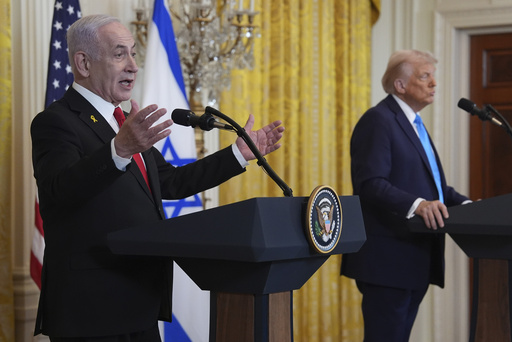GUATEMALA CITY — On Wednesday, top officials from the Trump administration clarified the President’s recent comments on the potential relocation of Palestinians from Gaza, which have faced backlash from various allies and even members of his own party. President Trump had proposed that the United States should consider the “permanent” resettlement of individuals from the conflict-stricken area and suggested that American troops could be deployed to aid in extensive reconstruction efforts.
However, Secretary of State Marco Rubio and White House Press Secretary Karoline Leavitt stated that the intention was more about temporary relocation of the approximately 1.8 million residents of Gaza while reconstruction takes place. This temporary measure was emphasized as necessary given the extensive damage inflicted during the prolonged fighting between Israel and Hamas over the last 15 months.
The notion of displacement has raised alarms among Palestinians who fear they may not be allowed to return if they leave, and it has also drawn criticism from Arab nations that Trump has urged to accept these individuals. Rubio characterized Trump’s proposal as a “very generous” opportunity to assist with the clearing of debris and rebuilding efforts in Gaza. “In the interim, obviously people are going to have to live somewhere while you’re rebuilding it,” he said during a press conference in Guatemala City.
During a separate briefing for reporters in Washington, Leavitt described Gaza as “a demolition site” and highlighted the devastation visible in the region. She asserted that living conditions in Gaza are currently “uninhabitable” and indicated that it would be “evil” to expect individuals to survive in such dire circumstances. Their comments appeared to contrast sharply with Trump’s earlier statements that hinted at permanent relocation to a more secure environment, emphasizing safety and stability for those displaced.
In a conversation with Israeli Prime Minister Benjamin Netanyahu at the Pentagon, Defense Secretary Pete Hegseth confirmed that the military is contemplating various options for Gaza’s reconstruction. “We look forward to working with our allies, our counterparts, both diplomatically and militarily, to look at all options,” he mentioned.
Afterwards, Netanyahu expressed his support for Trump’s ideas during an interview with Fox News, calling it a “remarkable idea” that should be pursued for the benefit of all involved parties. Despite this support, regional allies like Egypt and Jordan warned that relocating Palestinians could disrupt Middle Eastern stability and undermine ongoing efforts for a two-state solution that has been a primary goal for decades.
The Saudi Arabian foreign ministry responded pointedly to Trump’s remarks, reiterating their long-standing position advocating for an independent Palestinian state. They remarked that the international community must act to alleviate the ongoing suffering of the Palestinian people, emphasizing their commitment to their homeland.
Even some Republican lawmakers, including Senator Lindsey Graham, found Trump’s suggestions troubling, indicating that the idea of American troops entering Gaza would be a “non-starter” and advocating for traditional strategies of destroying Hamas while finding regional allies to oversee governance.
Rubio clarified that Trump’s proposition was not intended to come across as antagonistic. He stressed that what the President truly offered was assistance in humanitarian efforts, specifically for debris and munitions removal, as well as rebuilding shelters and businesses, ensuring that once the area is safe, people could return. Nevertheless, the White House indicated that Trump ruled out any financial aid from the U.S. for Gaza’s reconstruction.
Nevertheless, similar to Trump, Leavitt left the possibility open for the deployment of American troops, emphasizing his desire to maintain leverage during negotiations. Unfortunately, both Palestinians and Arab states have firmly rejected the idea of relocation, contradicting decades of U.S. policy which has aimed to establish a Palestinian state without displacing existing populations from Gaza or the West Bank.
These proposals come amid ongoing discussions by the Biden administration regarding a post-conflict plan for Gaza, which seeks to facilitate governance through the Palestinian Authority under U.N. supervision, alongside a multinational peacekeeping effort. President Biden previously attempted to finalize such plans before his departure from office by engaging Trump’s previous envoy for Middle Eastern affairs in discussions about a ceasefire for Gaza.



